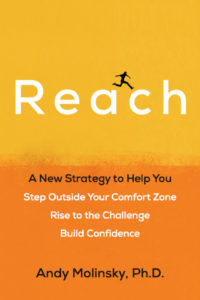Avoiding situations and tasks that frighten us in many ways is the most natural thing in the world. Evolutionarily speaking, it’s also probably helped our species to survive. The problem comes when you apply this very same fight-flight reaction to situations that aren’t genuinely life threatening – like taking on a new role, for example, or persisting at a task after multiple cases of failure.
When we avoid these sorts of situations, we get the temporarily relief from anxiety and fear, but we also limit real opportunities for growth and development.
So, how can we overcome the tendency to avoid in situations that feel well outside our personal comfort zones? One simple trick I’ve found to be quite useful is to ask yourself three simple questions:
1. What’s my doomsday scenario?
2. What’s my dream scenario?
3. What’s my most realistic scenario?
The doomsday scenario is that worst case type situation that your fear and worry is causing you to fixate on. It’s the idea that if you step up on stage to give that speech, you’re going to be a total flop… or if you open your mouth at that meeting, you’re going to completely embarrass yourself. The reason you want to think about – and even jot down – your doomsday scenario is to recognize that it’s really only one possibility – and an incredibly unlikely one at that. In fact, what’s often a useful follow up question to ask is whether this doomsday scenario is likely – and how likely or unlikely you actually think it is.
After pondering this doomsday situation, think about the opposite extreme: the dream scenario. The dream scenario is the absolute number one best case situation you can imagine – that, for example, you’ll not only rock it on stage, but that you’ll be crowned a speaking prodigy and featured at the next TED talk worldwide event…. Or that when you start speaking at the meeting, everyone will be wowed by your brilliance and fast track you to the corner office seat. Of course this all sounds very nice, but it’s probably as equally unrealistic as the doomsday scenario – and it’s important for you to note that as well.
And then finally, there’s the realistic scenario. The realistic scenario is the situation that is most likely to occur if you can put aside the worry gene and stop fantasizing about best-case scenarios. This is the relatively mundane reality most of us operate in: that when we step up there on stage, we probably won’t be a total flop…and, by the way, probably won’t wow the audience either. We’ll most likely have some good moments, and some not so good moments, but on the whole, it will likely be better than we think.
The key to stepping outside your comfort zone is to find a way to embrace this middle ground. It does you no good to fixate on extremes that are unlikely to occur, but very likely to disappoint. Instead, ground yourself in reality, focus on realistic possibilities, put one foot in front of the other, and do the hard work that it takes to perfect your craft.
In the end, there’s no magic formula for success. But there is a magical, distorted way of thinking that can undermine success. So, find your middle ground and make that your stepping stone for building confidence and courage.
Originally published on Inc.com
 AVAILABLE NOW
AVAILABLE NOW
Reach A New Strategy to Help You Step Outside Your Comfort Zone
According to Andy Molinsky, an expert on behavior in the business world, there are five key challenges underlying our avoidance tendencies: authenticity, competence, resentment, likability and morality. Does the new behavior you’re attempting feel authentic to you? Is it the right thing to do? Answering these questions will help identify the “gap” in our behavioral style that we can then bridge by using the three Cs: Clarity, Conviction, and Customization. Perhaps most interesting, Molinsky has discovered that many people who confront what they were avoiding come to realize that they actually enjoy it, and can even be good at it.